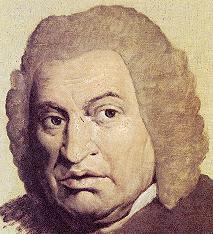









|
3. Samuel Johnson(1709-1784)
Life
 Samuel Johnson was one of the most important English writers of the
eighteenth century. It is long been traditional to refer to the second half
of the eighteenth century as “the age of Johnson”, just as the first half is
often “the age of Swift and Pope”; and Johnson is the single most quoted
prose writer in the English language in most dictionaries of quotations
(although Shakespeare and the Bible usually blow him away). But he is
usually remembered not as a writer but as a talker, as a personality --
mostly thanks to James Boswell’s Life of Samuel Johnson(1791).
Boswell in the biography eclipsed Johnson’s own writings; and in fact, many
of the famous lines in the quotation dictionaries come not from his works
but from Boswell’s recollection of his conversation.
Samuel Johnson was one of the most important English writers of the
eighteenth century. It is long been traditional to refer to the second half
of the eighteenth century as “the age of Johnson”, just as the first half is
often “the age of Swift and Pope”; and Johnson is the single most quoted
prose writer in the English language in most dictionaries of quotations
(although Shakespeare and the Bible usually blow him away). But he is
usually remembered not as a writer but as a talker, as a personality --
mostly thanks to James Boswell’s Life of Samuel Johnson(1791).
Boswell in the biography eclipsed Johnson’s own writings; and in fact, many
of the famous lines in the quotation dictionaries come not from his works
but from Boswell’s recollection of his conversation.
Samuel Johnson was born in September1709 in Lichfield,
England, the son of Michael Johnson, a bookseller in Lichfield. When three
years old, he was brought to London and caught the disease of scrofula which
affected his sight seriously, but he was from the early age an avid reader.
In 1728, he went to Pembroke College, Oxford, but a
lack of money forced him to leave thirteen months later. During this period
to the death of his father in 1731, Johnson appeared to have suffered a
serious mental stress. He worked briefly and unhappily as an under-master at
Market Bosworth and then moved to Birmingham, where he contributed many
essays and translated and adopted some works from French writers. In 1735,
he married Mrs. Elizabeth Porter and started a private school at Edial near
Lichfield. However, this starting witnessed as a failure, because of his
lack of a degree and convulsive mannerisms.
In 1737, he went to London with his pupil, David
Garrick, hoping to complete and sell his tragedy Irene and make a living as
a writer. Unfortunately, it was a failure just as his school. It is in 1749,
with the help of Garrick, he could begin to take miscellaneous writing jobs
as a living. He wrote biographies (including the Life of Savage),
political satires, and reports on the debates in Parliament. His first hit
came in 1738 when the poem called London, which was an imitation of a satire
by the Latin poet Juvenal, appeared. His other most famous poem The
Vanity of Human Wishes, published in 1749, was the first work that
signed his own name.
Around 1746, he settled on the plan of publishing a
dictionary—that was the Dictionary of the English Language, which was
out in 1755. This dictionary was considered as the first English dictionary.
While working on the Dictionary, he published a series of periodical essays
in The Rambler, which appeared twice a week from 1750 to 1752. He later also
contributed to two other series of essays, The Idler and The Adventurer. In
1752, his wife died, a loss that caused him great and prolonged grief.
In 1759, an oriental tale called Rasselas, which was a short
work of fiction, appeared. It was written to defray the costs of his
mother’s funeral. It tells the story of Rasselas, a Prince of Abyssinia, who
leaves the Happy Valley of his birth with his mentor, Imlac; his sister,
Nekayah; and her servant, Pekuah. In the episodic plot, the four travel
through Egypt looking for the happiest mode of life, but failed.
Johnson had scraped a living together from his writing,
but was never anywhere near rich. But the ministry of George III gave him a
pension of £300 a year in 1762.
James Boswell came to London in 1762, and met Johnson, in May
1763. From then until Johnson’s death in 1784, the two spent only around 240
days together, including a trip through the Hebrides in 1773, which Johnson
described in his Journey to the Western Islands of Scotland in 1775
and Boswell discussed in his Journal of a Tour to the Hebrides with
Samuel Johnson in 1785. But in spite of the relatively few days they
spent together, Boswell collected the anecdotal material for his Life in
this period. Johnson became one of the most eminent literary figures of his
day then. In 1764, he founded the Club, known as the Literary Club, which
attracted many of the contemporary figures such as Burke, Goldsmith Garrick,
Gibbon. Although he was a fervent Tory, Johnson was on friendly and intimate
terms with several well-known Whigs.
A long-promised edition of Shakespeare’s works appeared in
eight volumes in 1765. In the 1770s, Johnson visited several places: in
1773, to Scotland and the Hebrides, in 1774, to North Wales, and in 1775, he
went to Paris—his only visit to the Continent. During this decade, Johnson
returned to miscellaneous and political writings, few of which caught the
attention of amateur readers. But between 1779 and 1781 came a series
originally called Prefaces, Biographical and Critical, to the Works of
the English Poets, better known today as The Life of the Poets.
In 1784, saddened by the death of his best friend Levet
Thrale, he died at his house in Bolt Court and was buried in
Westminster
Abbey.

|
![]()
![]()